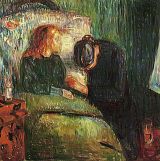The MacGuffin: News and Comment (22/Sep/2012)
(c) Ken Mogg (2012)
Sep 22
Critics and scholars are frequently guilty of following fashion and having favourites, including favourite styles and subject-matter - much like the rest of us, no doubt. We're all bound in subjectivity, after all. An apparent exception, said Schopenhauer, is the artist of genius who, by applying imagination … in order to complete, arrange, amplify … all the significant pictures of life', may approach 'the most complete objectivity'. I thought of the foregoing this week after watching the full 3½-hour version of Peter Watkins's remarkable Edvard Munch (1974), about the famous Norwegian artist (1863-1944) who pioneered 'intense subjectivity' in painting and is best known for 'The Scream' (1893, etc. - final lithograph version 1910) - which, however, was just one work among the series of paintings which Munch referred to as his 'Frieze of Life' and which spanned subjects depicting Angst, Love, Sex, and Death. (Note. Even that is quite a limited range! As Munch put it, for many years he had to feel and cling to pain and anguish - of which his life had at least its full share - because, 'without anxiety and illness, I would have been like a ship without a rudder'. I'll come back to this.) Now I'm going to declare myself. I see many affinities - and some relative differences - between Munch, Watkins, and Alfred Hitchcock; and if Watkins's film is a remarkably complex treatment of a 'subjective' painter, no less is it 'subjective' about the filmmaker himself (Watkins acknowledges a felt affinity to Munch) just as some Hitchcock films are themselves remarkably complex in depicting 'subjectivity' (e.g., that of the character Marnie in Hitchcock's 1964 film) even as Hitchcock himself sought to involve the audience in a collective 'subjectivity' of our own. I discussed this and related matters with our 'advanced' Hitchcock group this week. I noted how Watkins pays much attention to the various versions of 'The Sick Child' (1885-86, etc. - 1907 version shown below) - and draws on film editing to make his points superbly - to show how that work is not just about the death at a young age of Munch's sister Sophie but also concerns his own suffering, both in a recent love affair (with a married woman) and in earlier memory, including both the death of his mother and his own near-death experience from a childhood illness. (I told you this gets complex.) And I suggested that there is definitely something 'pre-Hitchcockian' here. I mentioned both the still under-appreciated The Lodger (which links the neurasthenic lodger's present suffering with memories of the death of his beloved sister, this in turn conflated with the lodger's memory of his mother, whom we see on her death-bed) and Marnie, with its complex rendering of interacting past and present suffering. I went into detail about this, and may do so here next time. But I want to keep to broad points for now. For example, researching Munch, I found that one of his artist friends in Berlin described his intense inner preoccupation thus: 'he need not make his way to Tahiti to see and experience the primitive in human nature. He carries his own Tahiti within him.' How close, in essentials, that is to what Hitchcock once told 'Newsweek': 'James Jones travelled to Hawaii, but with me it's imagination, it's supposin'. Once my front door is closed, I can be anywhere.' Of course, Hitchcock, the commercial filmmaker, liked to disavow 'deep' intent in his movies, claiming simply that their 'deepest logic' was 'to put the audience through it', and in Marnie even including a joke about 'the primitive in human nature' (which the film is actually concerned with!) by having Mark tell Lil, 'We'll bring you back a noble savage'. As for 'anguished' artists like Munch, there's a joke at their expense in The Trouble With Harry where artist Sam Marlowe nonchalantly mentions, 'I've been in a tortured mood lately!' But don't be fooled! Hitchcock was one of the great empathisers, who felt the emotions of all his characters intensely. And that brings me to my final point for now. As we've discussed previously (e.g., June 16, above), Hitchcock with his wit and genius could actually be both 'subjective' and remarkably 'objective' (as wife Alma affirmed in 1960). And an excellent article on Munch, on the World Socialist Web Site, makes a similar point about that painter. I just want to go a step further. The fact is that once Munch got past his 'mad' year, 1908, when he entered the clinic of a Dr Jacobson, he started to heal, and became quite the upstanding citizen in later life. Eventually he settled on a farm and continued to paint mainly rural subjects, often using his horse named 'Rousseau' (!) as a model. (Whether the horse's name refers to philosopher Jean-Jacques Rousseau, who once said, 'nothing is so gentle as man in his primitive state', or to 'Naïve' painter Henri Rousseau, it's likely that the 'noble savage' is again being valorised!) The only trouble is that critics and scholars aren't so impressed by things like mature detachment and witty acceptance of life. So Munch's later work goes relatively unremarked. A pity. To be continued.
This material is copyright of Ken Mogg and the Hitchcock Scholars/'MacGuffin' website (home page) and is archived with the permission of the copyright holder. |

